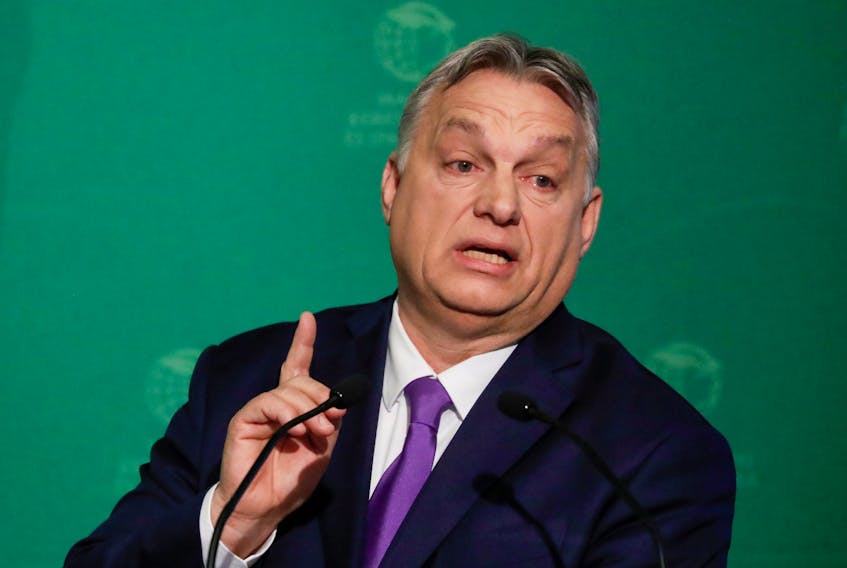“Hello, dictator!” said Jean-Claude Juncker cheerily to Hungary’s leader, Victor Orbán, at a European Union summit meeting a couple of years ago.
The president of the European Commission was only joking, of course, but it was gallows humour.
Dictatorship was clearly where Orbán was heading — and now he has arrived.
On Monday the Hungarian parliament passed a new law, allegedly to deal with the coronavirus crisis. It declares a state of emergency and allows Orbán to rule by decree for the duration of the crisis — but it doesn’t say when that state of emergency will end. That will be decided by the man who has just been granted supreme power.

Orbán’s spokesman, Zoltán Kovács, helpfully explained that “Just as in wartime, a state of emergency could extend until the end of hostilities. Today, we confront not a military power, but are in a war-like state to defend our people against a pandemic the likes of which
we have not seen in a century.”
“Never waste the opportunity offered by a good crisis,” as Machiavelli allegedly said 500 years ago.
So, is what we are seeing in Hungary now the tip of the iceberg? Will governments in other democracies whose leaders have dictatorial ambitions use the coronavirus crisis as an excuse to give themselves absolute powers?
Will Rodrigo Duterte take emergency powers to get around the one-term Filipino presidential limit that obliges him to quit in two years’ time? Will Narendra Modi copy Indira Gandhi’s 1975 emergency and set up as the “temporary” dictator of India? Will Recep Tayyip Erdoğan destroy what remains of Turkey’s democracy to save himself if his popularity declines further?
For that matter, will Donald Trump use the great wave of American coronavirus deaths in the coming months and an alleged threat of mass disorder as an excuse for postponing the November election, especially if his prospects for re-election are not looking bright?
It’s a toss-up with Duterte, who is responsible for so many murders that he can never safely retire. But for the rest, the answer is almost certainly no.
Both Modi and Erdoğan have created solid blocs of religious supporters who practically guarantee their political futures (at great cost to the unity and future prospects of their respective countries). They don’t need to destroy democracy to survive.
As for Trump, whose base is too narrow to assure him a political victory in November if other elements of his victorious 2016 coalition defect, he doesn’t really have the option of cancelling the election. Americans’ loyalty to their ancient constitution is still too strong to let that happen.
In any case, Trump probably won’t need such extreme measures to hold on to office. He is already re-writing the script so that his heavy responsibility for the silent carnage that awaits the country is erased in the public’s mind by his last-minute swerve towards a strong policy of social distancing that averts a much greater loss of life. Hail the saviour!
Which leaves us, then, with the question of why Orbán is going to such political extremes when he already had all the power he could possibly want.
He has already fiddled the constitution so that his party can win a two-thirds majority of the seats in parliament on only 44 per cent of the votes.
Hungary is effectively a one-party state, and the media and the judges both serve Orbán’s Fidesz Party, not the general public. He even had a state of emergency in place already, declared in 2016 during the great refugee flood of that year (though none of the refugees came to Hungary), and he has never rescinded it.
True, he can now hand out five-year prison sentences to Hungarians who spread “false” information, but the courts were already giving his critics multiple shorter sentences if they got too noisy.
Why go to this extra trouble when it might even tip the EU into expelling Hungary as a non-democratic country (although I wouldn’t hold my breath on that one)?
I once spent a day with Orbán in Budapest, when we were both much younger men. He was a student leader who had just got famous for defying the Communists with a fiery nationalist speech, and I had spent the summer in the Soviet Union interviewing the emerging democratic opposition. (We were introduced by Hungarian-born philanthropist George Soros, then Orbán’s mentor and later a prime target of his rabid anti-Semitism.)
We had much to talk about, and I enjoyed his company.
What struck me, though, was that he really thought like a lawyer. Maybe a radical one, and certainly later a corrupt one, but a lawyer by character and by training.
So, maybe what he’s doing now is just tidying up the law.
Hungary was already a dictatorship in practice. Now it’s also one in theory.
Gwynne Dyer’s new book is “Growing Pains: The Future of Democracy (and Work).”









